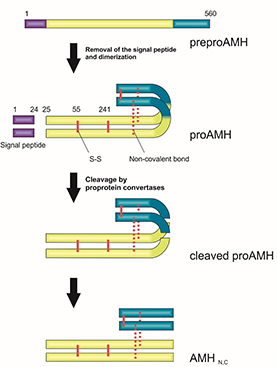 Anti-Müllerian hormone (AMH) is a dimeric glycoprotein that is
produced by granulosa cells in females and it is currently considered to
be the most reliable biomarker for the assessment of ovarian reserve in
women. The AMH secretion in ovarian granulosa cells starts at
approximately the 37th
week of pregnancy and it reaches peak values in the bloodstream around
the age of 25 years. After this, it gradually declines until menopause,
when it becomes undetectable.
Anti-Müllerian hormone (AMH) is a dimeric glycoprotein that is
produced by granulosa cells in females and it is currently considered to
be the most reliable biomarker for the assessment of ovarian reserve in
women. The AMH secretion in ovarian granulosa cells starts at
approximately the 37th
week of pregnancy and it reaches peak values in the bloodstream around
the age of 25 years. After this, it gradually declines until menopause,
when it becomes undetectable.

Fig.1 Schematic representation of circulating AMH forms formation.
The measurement of AMH can be used in fertility investigations in
order to help predict the response of women to ovarian stimulation,
estimate the time to menopause, and also to diagnose and monitor women
with polycystic ovary syndrome (PCOS).
We provide five in vitro produced monoclonal antibodies that are specific to human AMH. Our Mab pairs recognize both the proAMH and AMH N,C
forms. The antibodies can be used for the development of quantitative
immunoassay, which enable the detection of native AMH in human serum. In
our in-house assay, our Mab pair shows a limit of detection 2 pg/mL and
the correlation compared to the commercially available AMH assay is
0.95.

Fig.2 Correlation of HyTest’s MAb pair to the commercially available reference assay.
Learn more:
AMH TechNotes